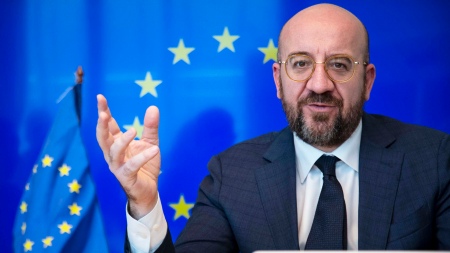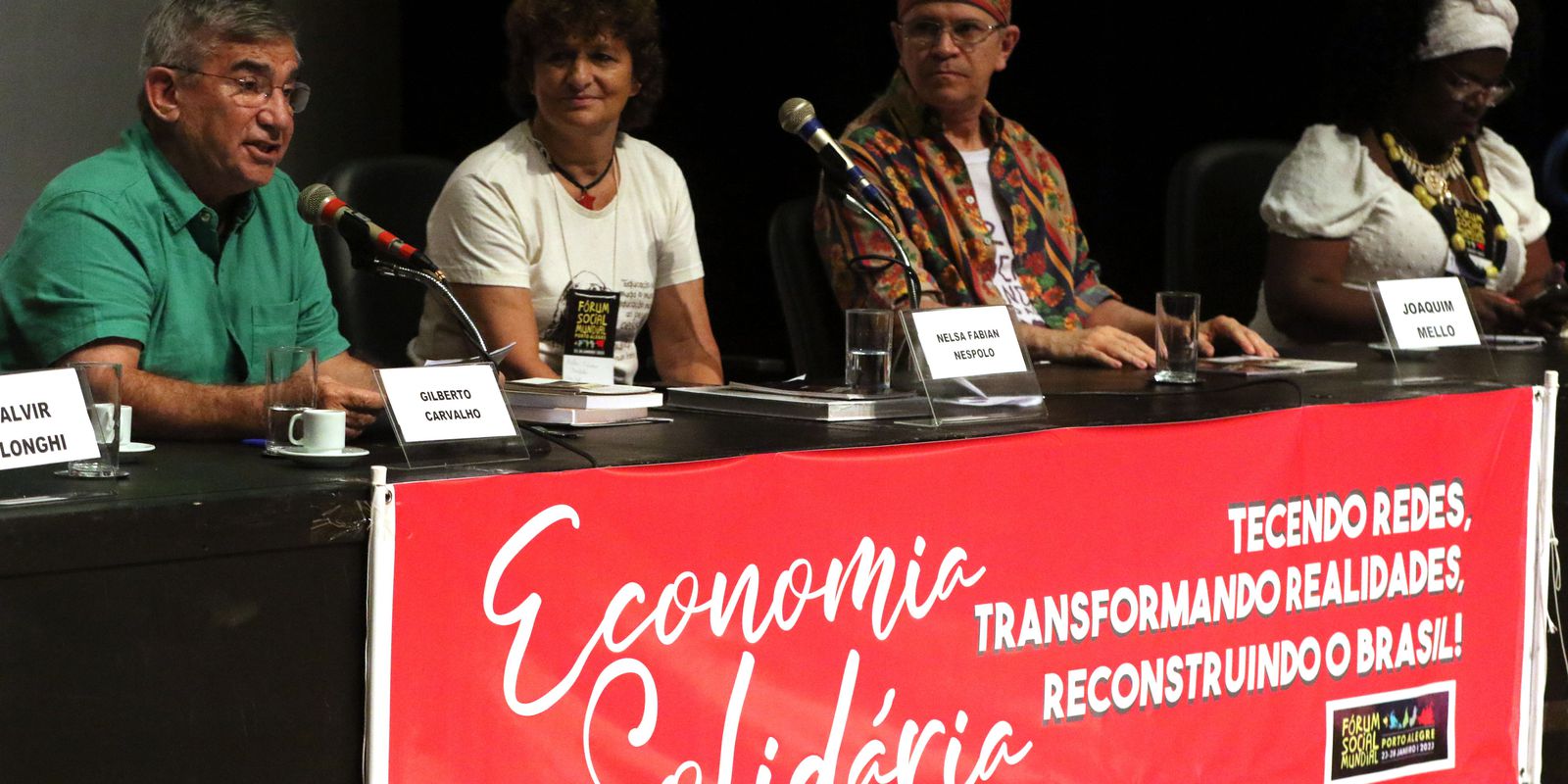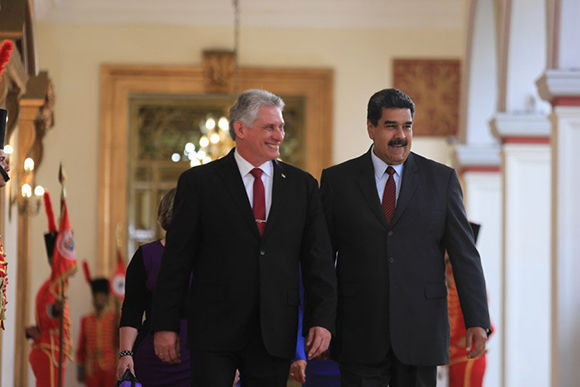The President of the European Council, Charles Michel, considered this Wednesday that the arrival of Luiz Inácio Lula da Silva to power in Brazil will facilitate the relationship with the European Union (EU), but will also help in the ratification of the bloc’s free trade agreement with Mercosur, for which the Europeans must show that they are a “reliable partner”.
“I think there is a feeling of doubt towards the EU regarding trade agreements and also from the EU, we have to show that we are serious and that we want to commit and we want to be seen as trustworthy,” Michel said. in a meeting with a small group of journalists in which Télam participated, one day after he attended the VII Summit of the Community of Latin American and Caribbean States (Celac) held in Buenos Aires.
The Belgian politician, who highlighted the importance of Latin America for the European Union and in this context he mentioned the impulse that the summit can give that the bloc will hold on July 17 and 18 in Brussels with CelacI consider that 2023 could be the year in which the Mercosur-EU agreement is finalized.
“We are very close to signing,” he said.and pointed out that the key will be that there is “balance” for both parties.
“We have within the EU and you have within the Mercosur countries an important automotive industrial sector. We can think about how to find constructive ways to guarantee the balance of supply chains in this field,” he said.
According to Michel, this was not an issue 20 years ago, when the agreement began to be negotiated, “but today it is more of a challenge than ever and it can be a good example of an approach based on interdependencies and not on overdependencies”.
Michel admitted that in the past the EU used trade agreements “as a powerful lever to achieve more prosperity” within the bloc.but also in partner countries, and in turn to disseminate European values in relation to working conditions or environmental issues.
And he considered that the bloc faces the challenge of being “more transparent”, since before there was “too much opacity”, “and at the end of the negotiation process, some national parliaments, members of civil society, had the impression of being taken by surprise, discovering things they didn’t like.
At the same time, he said that priorities must be identified, “since it is not possible to solve all the world’s problems through trade agreements.”
Also, highlighted the “clarity” that Lula’s presence in the Government of Brazil provides in the face of new challengessince the circumstances changed compared to the time of the start of the negotiations, especially in relation to issues such as climate change or deforestation.
“We did not have the impression that the Bolsonaro government could be a reliable partner in relation to these concerns,” he said, referring to the former president’s policy, which denied the impact of deforestation in the Amazon, for example, which registered record values during his last year in government.
For this reason, he pointed out that one should not “underestimate the impact of the new Brazilian government for the EU.” And, as an example, he recounted that since 2014 a meeting between the European Union and Brazil could not be held. “I met Bolsonaro two or three times on the sidelines of multilateral meetings, but they were not formal meetings, we just passed each other,” he said.
“Welcome back Brazil. A new era of cooperation between the EU and Brazil begins: on climate change, biodiversity, trade and multilateralism,” Michel wrote Tuesday on Twitter after meeting Lula on the sidelines of the Celac summit.
The President of the European Council, who this Wednesday held a bilateral meeting with Alberto Fernández, reported that in the meeting he attended in Buenos Aires he met with strong interest from the leaders present on how the operating mechanisms of the block are.
“It was interesting to understand how many of these countries are interested in the European model as a possible inspiration for regional integration”he pointed out, and recalled that at the last Celac summit, in Mexico, it was very useful for him to observe the internal disputes, but at the same time the interest in cooperating.
“I am not surprised that we have the same challenges within the EU. We also have our tensions, our difficulties, our different views on things. But there is this political will to try to overcome difficulties to be united. It takes time. It is extremely difficult , but there is an added value, and that is that this European unity contributes something more than the simple sum of 27 national interests,” he said.
For this reason, he said that he believes in the value of regional organizations to offer “greater stability, peace and prosperity.”
In line with what was proposed yesterday at the Celac summit by Colombian President Gustavo Petro, who suggested finding a concrete project to help integration, Michel cited the example of the coal and steel community in Europe, which set the bases for the conformation of what is today the EU.
In any case, he admitted that “we must be realistic” and take into account that the formation of the European Union took decades of “hard work”.
Asked if he was not worried about China’s influence in Latin America, he said he was trying not to be too impressed by what others are doing.
“The others have their agenda,” he said, without outright mentioning China. “One thing is clear: we, the EU, have no hidden agenda. We want peace, prosperity and stability. We are absolutely transparent,” added.
Michel, who was in Ukraine last week with President Volodimir Zelenski, welcomed the fact that Germany has approved the shipment of Leopard tanks to Ukraine and considered that the bloc’s “historic” decision to send weapons to third countries was mainly due to Russian aggression.
“I thank the German government for providing clarity and for making this decision. I think we need to support Ukraine, because the Ukrainians are fighting for their future, but also for democratic values,” he said when asked by Telam.
Under pressure from allies after weeks of reluctance, the government of Foreign Minister Olaf Scholz announced Wednesday that it would send German Leopard tanks to Ukraine to fight Russia and approve requests for other countries to do the same.
Ukraine and its allies hailed Germany’s decision, but Russia denounced it as an “extremely dangerous” escalation of a conflict that is raising fears of war between Russia and NATO.
Michel rejected that the sending of tanks represents an escalation and considered that in any case the escalation was Russian aggression, when the Kremlin decided to invade Ukraine in February of last year, “and when they decided to mobilize another 300,000 soldiers, when they threatened with nuclear weapons, when they used the Zaporizhia nuclear power plant as a military base, or when they used the Black Sea as a battlefield.”
“There is an aggressor, which is the Kremlin, and a victim, which is the Ukrainian people. Those are the facts,” he added.
For the president of the European Council, which represents the heads of state and government of the 27 EU countries, the “absurd” war launched by Russia led to NATO’s growth, instead of shrinking, as the Kremlin wanted, and for the bloc to be “more united than ever”.
“For the first time we decided to send weapons to a third country. A historic decision that would never have been possible more than a year ago. And the ties with the United States are stronger because of this war they launched. Exactly the opposite of what they wanted.” , pointed out the Belgian politician.











